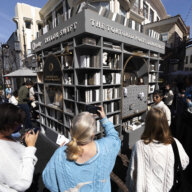By 2020, it will be as easy as swiping a cell phone past a card reader for SEPTA passengers to ride a replenished fleet of buses and trains between a plethora of renovated and newly built stations.
Or riders will be looking at reduced service and the possibility of sizable fare hikes.
SEPTA officials are unsure which to expect as Republicans get ready to assume control of Harrisburg with transit funding largely uncertain.
“If there isn’t the funding, they will be deciding how to restart the system after five years of no service,” SEPTA General Manager Joe Casey said. “We don’t have the flexibility to come up with money.”
Casey pointed to aging substations and bridges as concerns. While it once seemed like SEPTA would be able to make repairs and advance new initiatives, the failure of Act 44 has taken that away.
“I think that oil prices are going to have enough of an impact on people that they will understand that we need alternatives, even if they don’t use it themselves,” said Matt Mitchell of Delaware Valley Association of Rail Passengers.
SEPTA’s future
Seven things to expect of SEPTA by the year 2020:
» New payment technology: Tokens and paper transfers should finally be a thing of the past.
» More trains: Silverliner Vs and VIs will replace trains that are about 40 years old.
» City Hall rehab: The nearly $100 million renovation of City Hall and 15th Street stations will include ADA improvements and aesthetic enhancements to the main Center City station.
» Elwyn Line extension: SEPTA will restore service to Wawa, Delaware County to accommodate suburban passengers. (The community, not the store, of course.)
» Hybrids: The entire bus fleet will be made up of hybrid vehicles.
» Eastwick Transportation Center: SEPTA will build a new station to replace the one at Bartram Avenue and 84th Street.
» Paoli Center: A $35.6 million transportation hub will be built in Chester County, including bus facilities, commuter parking and high-level platforms.





























